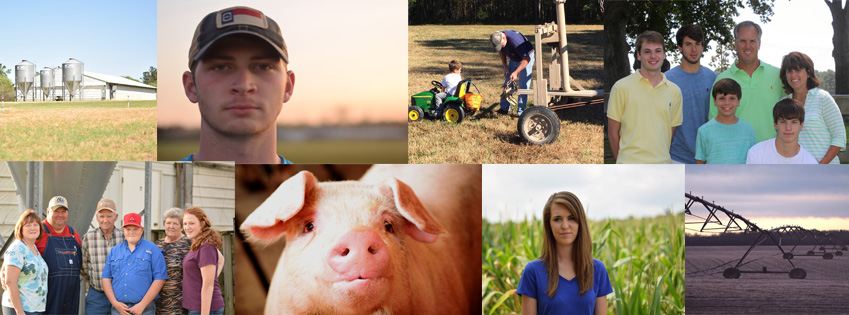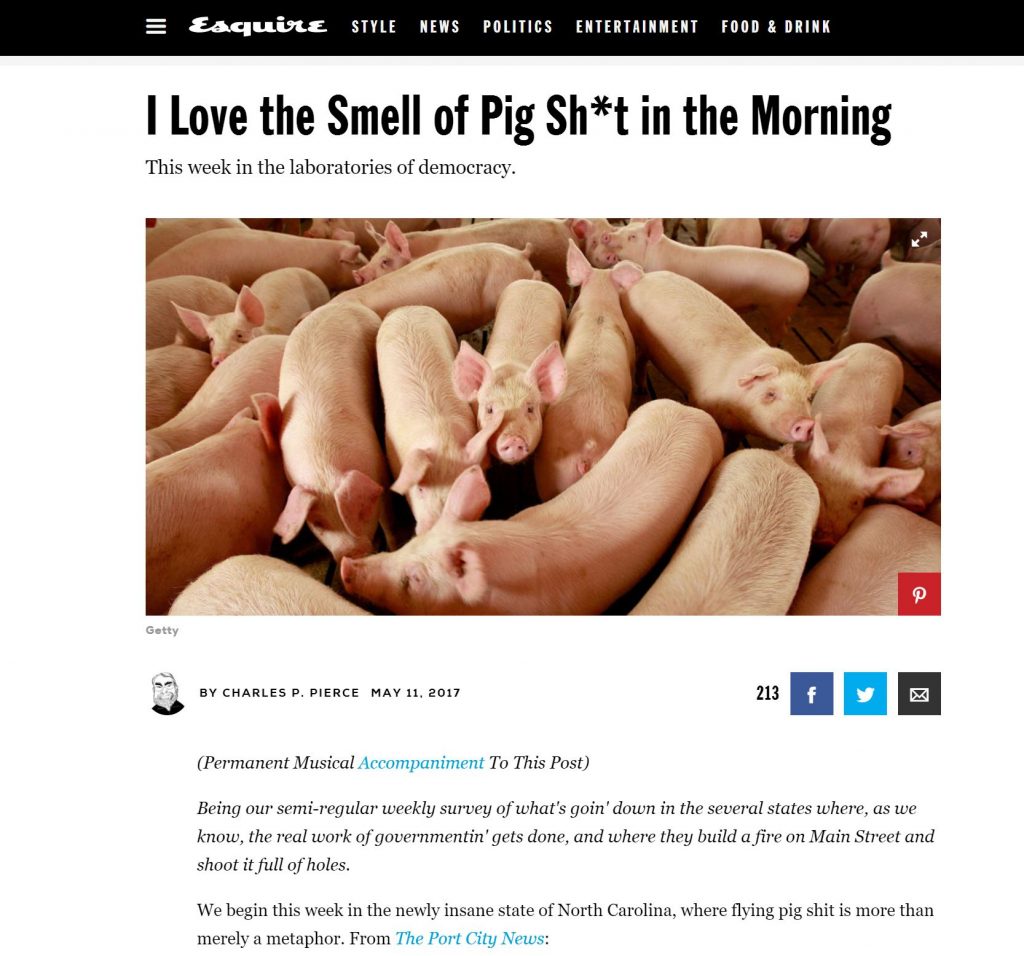Last fall the day after the hurricane the Waterkeepers Alliance spun a tale to the Washington Post and the Post published this photograph (below) to prove hog farms swamped by the hurricane were spreading pollution: Two days later Deborah Johnson of the Pork Council emailed the Post: This isn’t a photograph of a hog farm. It’s a municipal wastewater treatment plant.When the Post didn’t reply Johnson wrote a letter to the editor – but the Post didn’t publish the letter.Then Angela Fritz of the Post wrote her: “It’s been a busy week for us but I just wanted you to know that we received your email and we’ll get back to you soon.”No one heard from the Post for the next four months.Then, in February, Mrs. Fritz responded to another email by saying, Let me talk to my co-authors…and I’ll get back to you soon.March, April and part of May passed with the Pork Council asking over and over for a correction but the photo remained on the Post’s website. Then, almost seven months after the story ran, the Post published a correction – sort of. It added one line to the story on its website: “Correction: A previous version of this story included before-and-after photos of a flooded hog farm that was inactive. We have removed that photo.”With the stroke of a pen the Post had turned the Hookerton municipal waste treatment plant from a hog farm into an ‘inactive’ hog farm. At best, that’s a half-apology. But, at least, the newspaper removed the photo.
Two days later Deborah Johnson of the Pork Council emailed the Post: This isn’t a photograph of a hog farm. It’s a municipal wastewater treatment plant.When the Post didn’t reply Johnson wrote a letter to the editor – but the Post didn’t publish the letter.Then Angela Fritz of the Post wrote her: “It’s been a busy week for us but I just wanted you to know that we received your email and we’ll get back to you soon.”No one heard from the Post for the next four months.Then, in February, Mrs. Fritz responded to another email by saying, Let me talk to my co-authors…and I’ll get back to you soon.March, April and part of May passed with the Pork Council asking over and over for a correction but the photo remained on the Post’s website. Then, almost seven months after the story ran, the Post published a correction – sort of. It added one line to the story on its website: “Correction: A previous version of this story included before-and-after photos of a flooded hog farm that was inactive. We have removed that photo.”With the stroke of a pen the Post had turned the Hookerton municipal waste treatment plant from a hog farm into an ‘inactive’ hog farm. At best, that’s a half-apology. But, at least, the newspaper removed the photo.
News Article
Esquire, stick to the subjects you know best
The latest attack on North Carolina hog farms comes from an unlikely source: Esquire magazine.
Now, Esquire is a perfect resource for celebrity interviews, men’s fashion advice, and things like that. Just this past week, they posted helpful articles such as How to Take the Stress Out of Wearing Suede Shoes and How to Pick a Haircut Like Your Celebrity Hair Doppelgänger.
When it comes to those important issues, Esquire is a “go to” resource. But an article this week about HB 467 and North Carolina hog farms (I love the smell of pig sh*t in the morning!) proves that they don’t know sh*t about farming.
The article repeats the same tired, untrue claims that have been made for years by the Waterkeeper Alliance and others who want to put North Carolina family farmers out of business. The writer claims that, “wind being what it is, sometimes the spray takes wing and people's houses get a primer coat of pig shit.”
To further illustrate the point, Esquire quotes Cape Fear Riverkeeper Kemp Burdette: “You could be sitting on your back porch, and depending on the wind, have hog (expletive) sprayed on your kids."
Clearly, this reporter didn’t bother to learn anything about our industry or the strict regulations that all North Carolina farmers must follow, including a mandatory 200-foot setback from their neighbors.
Esquire should stick to the subjects they know best, like this one: You Don't Have to Be on Vacation to Drink a Piña Colada.
Statement by North Carolina Farm Families on Veto of House Bill 467
 Governor Cooper’s veto is a hard-blow to farmers. The pork industry invests billions of dollars in North Carolina. Farmers and integrators support their communities and give generously to charitable causes. They strive every day to be good environmental stewards and, above all, good neighbors. The hard-working family farmers who raise hogs in North Carolina deserve better than this.If Governor Cooper’s veto stands, it will jeopardize tens of thousands of jobs in our state. It will jeopardize the incomes and economic survival of thousands of farm families. The economic losses could be devastating to rural communities. The only winners will be predatory lawyers who swoop into rural communities, turn neighbor against neighbor for one purpose – to generate huge financial windfalls for themselves.HB467 passed both the House and Senate with support from Democrats and Republicans. We call on the North Carolina General Assembly to quickly override Governor Cooper’s ill-advised veto.
Governor Cooper’s veto is a hard-blow to farmers. The pork industry invests billions of dollars in North Carolina. Farmers and integrators support their communities and give generously to charitable causes. They strive every day to be good environmental stewards and, above all, good neighbors. The hard-working family farmers who raise hogs in North Carolina deserve better than this.If Governor Cooper’s veto stands, it will jeopardize tens of thousands of jobs in our state. It will jeopardize the incomes and economic survival of thousands of farm families. The economic losses could be devastating to rural communities. The only winners will be predatory lawyers who swoop into rural communities, turn neighbor against neighbor for one purpose – to generate huge financial windfalls for themselves.HB467 passed both the House and Senate with support from Democrats and Republicans. We call on the North Carolina General Assembly to quickly override Governor Cooper’s ill-advised veto.

